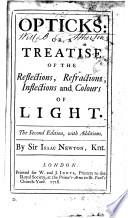Query 31 : Have not the small particles of bodies certain powers, virtues, or forces, by which they act at a distance, not only upon the rays of light for reflecting, refracting, and inflecting them, but also upon one another for producing a great part of the Phenomena of nature? <br/> How these Attractions may be perform'd, I do not here consider. What I call Attraction may be perform'd by impulse, or by some other means unknown to me. I use that Word here to signify only in general any Force by which Bodies tend towards one another, whatsoever be the Cause. For we must learn from the Phaenomena of Nature what Bodies attract one another, and what are the Laws and Properties of the attraction, before we enquire the Cause by which the Attraction is perform'd, The Attractions of Gravity, Magnetism and Electricity, react to very sensible distances, and so have been observed by vulgar Eyes, and there may be others which reach to so small distances as hitherto escape observation; and perhaps electrical Attraction may react to such small distances, even without being excited by Friction
Opticks (1704)
Context: It seems probable to me that God, in the beginning, formed matter in solid, massy, hard, impenetrable, moveable particles, of such sizes and figures, and with such other properties, and in such proportions to space, as most conduced to the end for which He formed them; and that these primitive particles, being solids, are incomparably harder than any porous bodies compounded of them, even so very hard as never to wear or break in pieces; no ordinary power being able to divide what God had made one in the first creation. While the particles continue entire, they may compose bodies of one and the same nature and texture in all ages: but should they wear away or break in pieces, the nature of things depending on them would be changed.<!-- Book III, Part I, pp.375-376 http://books.google.com/books?id=XXu4AkRVBBoC

